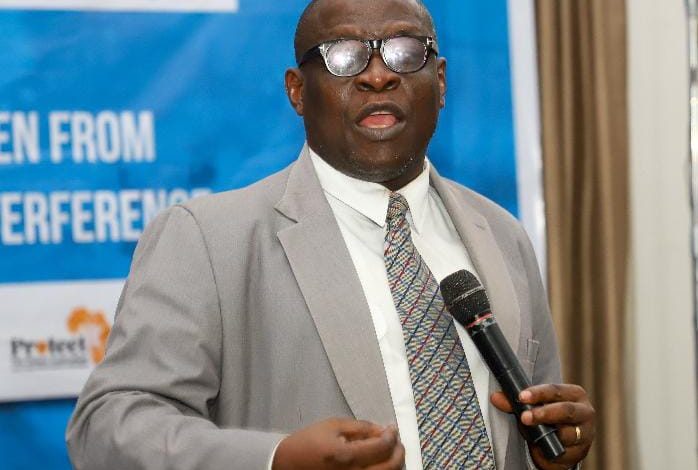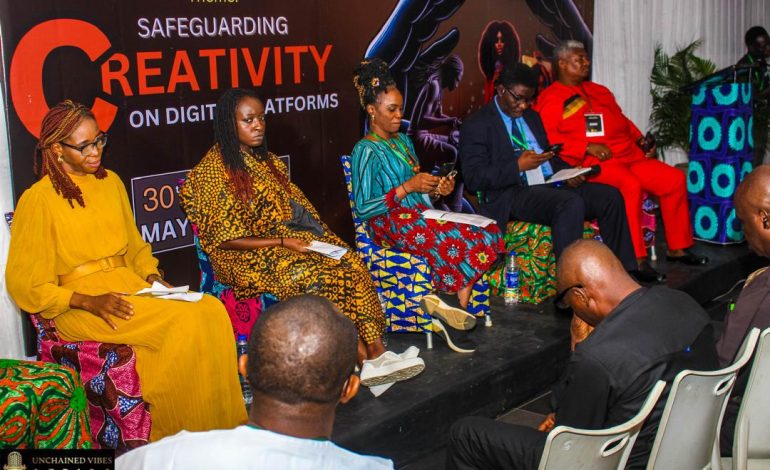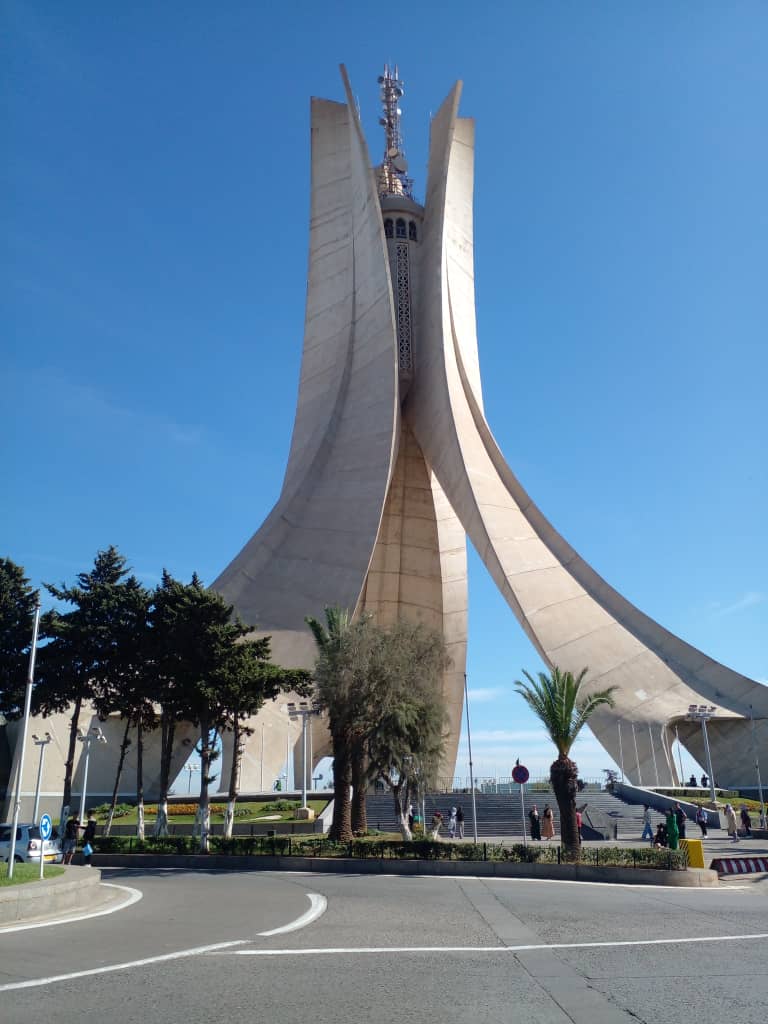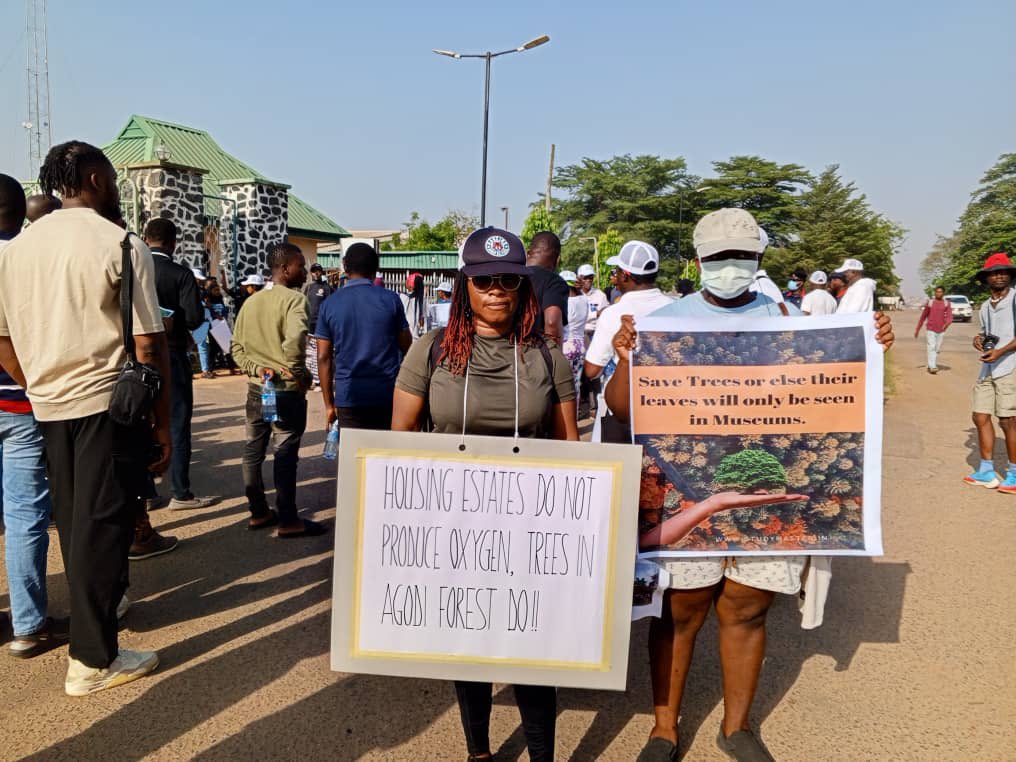Transformative training unveils strategies for community-based tourism development
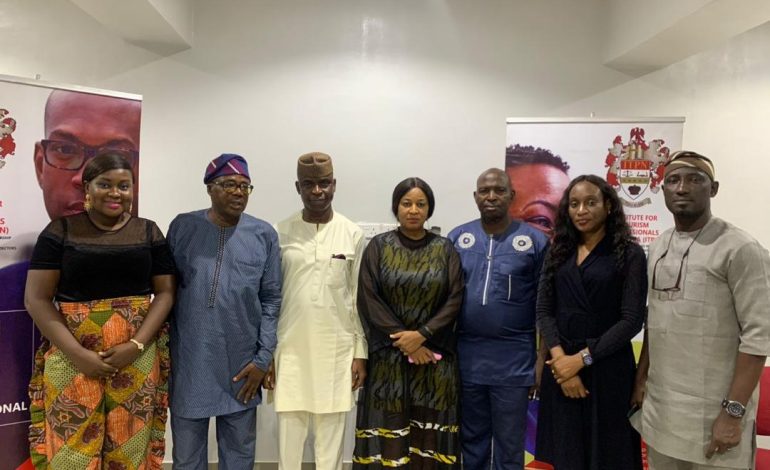
By Godwin Okondo
THE Institute for Tourism Professionals of Nigeria, Lagos Chapter, recently organised a transformative two-day training programme aimed at empowering tourism officers across local government areas in Lagos State to community-based tourism. Themed ‘Business Principles and Strategic Planning for Community Based Tourism,’ the training, held on May 15 -16, 2024 at Public Service Staff Development Centre (PSSDC), in Magodo, Lagos, served as a beacon for industry professionals seeking to revitalize and harness the potential of community-based tourism. The programme, which was graced by prominent figures in the tourism sector, featured insightful discussions and presentations that shed light on the evolving landscape of tourism and the imperative of community engagement.
The lead paper ‘Understanding Community-based Tourism: Definition, Characteristics, Principles and Examples of Community-based Tourism’ was delivered by the CEO, Clymaxx Heritage Travels and Tours Limited and Vice Chairman II, Institute for Tourism Professionals of Nigeria, Lagos Chapter, Mrs. Gloria Abiodun. According to her, “Anyone who ventured into travel years ago would have to start from ticketing, but today some people do tours without doing ticketing and vice versa. Tourism is very wide. What made you accept the offer to be a tourism officer?
“The pandemic affected the tourism industry, and after which some people left the industry. I was able to remain relevant because of my passion for tourism. That’s one of the motivating factors for me. Ever since you took the position, have you been able to effectively play your role? What impact have you been able to make in your community?
“We have tourism states like Akwa Ibom and Calabar, which are making impact, even with the little resources available. They are fortunate now because the governors are tourism-minded. They have realised that this is another way to generate income for their state without relying on the federal government. They’ve been able to revive Ibom Air.
“Landmark was pulled down recently by the Lagos state government. As soon as that happened, Akwa-Ibom State Government cashed in on that situation and struck a deal with Landmark. Landmark was operated by private organizations, while Lagos State Government is here. While Landmark was here, how many of you were able to see it as an opportunity for your local government to crack into it? As an officer, you need to go out and monitor places.”
Abiodun further highlighted aspects of community-based tourism and how they can participate to feel its impact in terms of financial gains.
“Community-based tourism refers to the conventional tourism model focusing on profit-generation and visitor satisfaction,” Abiodun said. “The community must see a potential in participation and what they stand to gain, and at the same time, satisfying the tourists. For example, when the Eyo festival is on, there are a lot of things that need to be put in place, cultural rites that need to be respected. Some people see it as an opportunity to make money. It’s a collaborative thing. If the people are hostile to the guests, guests wouldn’t want to come for the festival next time.
“The purpose of Community-Based Tourism (CBT) is profit-generation for the businesses involved in the tourism industry, and visitor satisfaction. We have businesses like hotels, transportation, security, food vendors, restaurants, and some of these are privately owned. The members of these communities see this as an opportunity to boost their small scale businesses, and they would want it to be a regular thing, and they would look for ways around this. Some festivals, according to tradition, are held in a particular period of the year. So, plans should be made to involve the locals and impact their lives, and improve the culture, and also look for ways to invite foreigners to the festival. There are lots of factors to be considered before it can be implemented.”
She also spoke on the responsibility of tourism officers in government, as enablers of community-based tourism, adding, “There should also be a balance when you talk about generating profit. Are you talking of generating profit for the community or the government? You represent the government, at the same time, make sure the people and culture you are representing are satisfied and give them a reason to participate again.
“CBT is a sustainable and equitable form of tourism that involves active participation and empowerment of local communities in the planning, development, management and distribution of benefits from tourism activities within their geographic area. Each local government has something peculiar to it. By interacting with the locals, you learn about the culture and foundation of the community and research on ways to revive what has been forgotten. As you get information from them, work on it, and pass them to the right authorities.
“To sustain tourism in your local government, you need to get the right information to know how to kick-start it, implement it, and be able to contain it. CBT plays a crucial role in sustainable tourism development for several reasons. Local communities can be empowered when they are involved in the decision-making process, allowing them to take ownership of tourism initiatives and providing opportunities for social and economic development. The locals will be the ones to tell you how to go about the festival, and what should or shouldn’t be done. You have to respect their culture.”
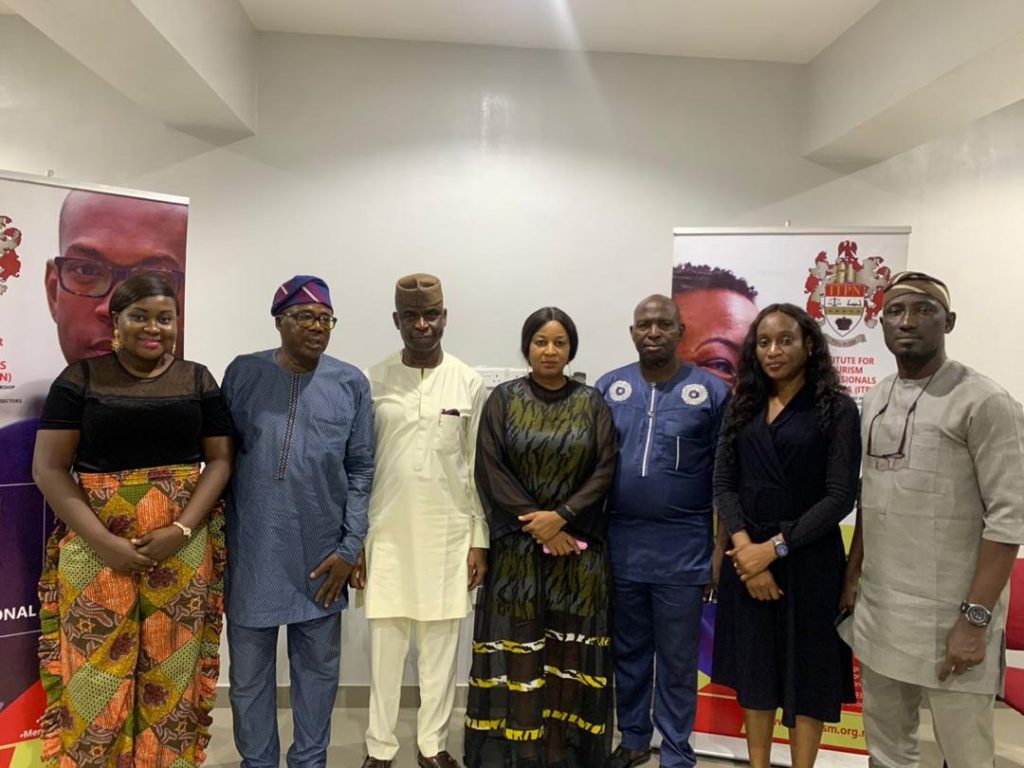
Secretary General, MITPN Lagos Chapter, Esther Adetutu (left); Chairman ITPN Lagos Chapter, Dr. Babatunde Mesewaku (FITPN); National President, ITPN, Chieff Abiodun Odusanwo (FITPN); Mrs. Chinyere Uche-Ibeabuchi, AITPN; Vice Chairman I, ITPN Lagos Chapter, Mr. Wale Odeyemi (FITPN); Vice Chairman II, ITPN Lagos Chapter, Mrs. Gloria Abiodun (MITPN) and Dr. Damilare MITNP and President of Lagos State Local Government Tourism Officers.
“Cultural heritages can be preserved. CBT prioritizes the preservation and promotion of local culture, as well conservation of national resources by environmental stewardship by encouraging sustainable use of natural resources and minimizing negative impact on the environment. If there are more attendees than expected, they could end up causing damages at the place, and you end up spending more than what you generated on repairs. You can create economic benefits for local communities by channeling tourism revenue directly to community members by offering home stays. Look at peculiar things people look forward to and encourage them to develop it, so they can see an opportunity to make money through it.”
Another lead paper was delivered by the Vice Chairman I, Institute for Tourism Professionals of Nigeria, Lagos Chapter, and former Director, National Institute for Hospitality and Tourism, Mr. Rotimi Odeyemi. It had as themed, ‘Marketing and Promotion of Community-Based Tourism Resources at the Community Level’.
Odeyemi said the tourism industry is dynamic and does not wait for anybody, adding, “As a tourism officer, do you know the kind of industries or how many sectors you used to have in your locality? Aside from civil service job, your salary can never be more than N150,000, but there are businesses you can do in your local government as a tourism officer and you would make money. Do you know how many event centres, travel agencies, hotels, logistic companies and store operators are in your locality?
“Tourism is an industry within an industry. It is so wide; many of you, when you are commuting out of your house, you are passing through a tourism heritage site, until you get to your office. Those who are officers in Kano State tourism board are making their money. Every month, aside salaries, they are collecting allowances. When they receive guests from another state, that visitor can be allowed to stay in any hotel free of charge.
“When you talk of tourism, there are three players – the service providers, the tourism services and the public sector. The public sector doesn’t own any of the infrastructure in tourism. They are regulators. The first to organize tourism in Nigeria is the Nigerian Tourism Board (NTB), which was set up by Decree 54 in 1976. This was superceded by Decree 81 of 1992. That decree clearly states out the duties and functions of the federal, state and local governments.”
Odeyemi gave the historical evolution to the changes that have taken place in the regulatory regimes over the years in the sector and where it is today, saying, “In 2004, there was an Act of the National Assembly, and in 2022, Nigerian Tourism Development Corporation had another amendment, changing it to Nigerian Tourism Development Agency. Since then, if there is any exhibition in tourism, they are incommunicado. The hotel licensing law in Lagos State of February 2003 was the beginning of recognition, which was superceded by Lagos Hotel licensing Edict of November 2003. The edict is after money, and it doesn’t look at how to manage the tourism attraction.
“Lagos State is part of tourism. In those days, people come from Ibadan to visit the beach. Today, there is nothing like that. You have to put your functions under a good edict that would guide you. There are 10,800 hotels in Lagos today, and not all of them are registered. Without you, the state cannot succeed in doing this.”
Addressing the issue of policy making to guide tourism officers, Odeyemi said, “You cannot operate without policy directions. The way it is, what is your function as a tourism officer? You all know what you have in your local government, but immediately you tell anyone in the state, they ask you if it’s your job. There is no policy to protect you. If there is a policy direction, or an enabling House of Assembly edict, there is no way to encourage you. The issue here is that you are sitting on millions of naira.
“Foreigners would come to the country and they would ask for a good hotel, and they would be directed to the tourism officer. This is the way it should be, but its not happening. There must be an edict to enable you to function. There must be an amendment of the edict in Lagos State to give legal backing to that area.
“When you talk about marketing tourism, I laugh. How many of your attractions are available? You don’t sell what you don’t have. That amendment to the edict gives room for the existence of tourism building in each local government of the state. The Nigerian Tourism Board doesn’t have local governments in the law setting it up. The 1992 amendment stated that all 774 local governments must have tourism units. If your boss or director doesn’t know what tourism is, that could be the case. But on the other hand, they don’t know the enormity of your job. You must take census of all the population. In Lagos State, we have natural resources, man-made resources and cultural resources, and theme parks, but they are not fully utilized.”
Odeyemi broke down the levels of tourism marketing available within which tourism officers can operate, noting, “In the tourism market, we have two aspects; the International and the domestic. Within the domestic, do you know there are some people in Lekki, Ajah or Ikoyi, who don’t know Fagba? Some people in Sango have never been to Ikorodu. How many universities do we have within Lagos and Ogun States? After exams, the students would want to go out and enjoy themselves. As tourism officers, you should have packaged a few places for them and you are making your money.
“As tourism officers, you get close to your potential market at the domestic level. This is what you should do as tourism officers. Expenditure can be equal to income. If you know what it takes to be a tourism officer, you understand what it takes to operate within the level of a tourism officer at the local government level. If we are looking at some of these things from a little angle, we are not going anywhere.”

